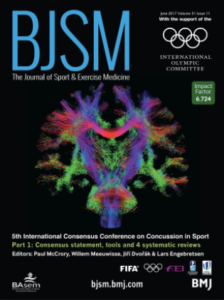Objective: King-Devick test as a rinkside tool for concussion diagnosis.
Design: K-D was administered to hockey players immediately after removal from the game with a suspected concussion. Results were compared to baseline. Concussion was suspected with slowing by > 5.2 sec. Setting: Hockey games. Participants: Hockey players (male/female)– school-based hockey academy and a Canadian junior hockey team. Interventions: Athletic trainers were trained in the use of K-D and obtained baseline K-D times for players. AT’s administered the K-D test to hockey players immediately after removal from the game with a suspected concussion. Main outcome measures: K-D time post-injury was compared to the K-D time baseline.
Results: During the 2015–16 season, K-D testing was collected on players with suspected concussion (42 concussions identified out of 148 players). Of the 42 concussions, 13 had K-D sideline testing done immediately post-injury; 8/13 demonstrated > 5.2 sec slowing in their K-D baseline scores. All were further evaluated with a comprehensive concussion assessment protocol that included symptom scoring-balance assessments-cognitive testing. Concussion was confirmed with this diagnostic approach in 8/8 players with K-D times slowed by more than 5.2 sec.
Conclusions An ideal concussion sideline diagnostic tool should be inexpensive, portable, reproducible, fatigue-tolerant, resistant to test-retest learning and suitable for non-medical personnel. The King-Devick test, that assesses saccadic eye movements, has these characteristics. It can be administered in less than 2-minutes. It has been reported that a post-injury slowing of K-D times >5.2 seconds is diagnostic of concussion. Sideline/rinkside K-D testing with > 5.2 sec slowing compared to baseline results accurately identified concussion with 100% accuracy.
Summary Points:
- The K-D Test is an ideal sideline tool that is inexpensive, portable, reproducible, fatigue-tolerant, and suitable for non-medical personnel.
- It assesses saccadic eye movement and can be administered in less than 2 minutes.
- In this study of school-based academy and Canadian junior hockey, rinkside K-D testing accurately identified concussion. K-D scores were more than 5.2 seconds slower from baseline for the concussed athletes.

